Exploring Research Prospects and Collaboration Opportunities: Discussion of Strategic Projects Held at HSE University
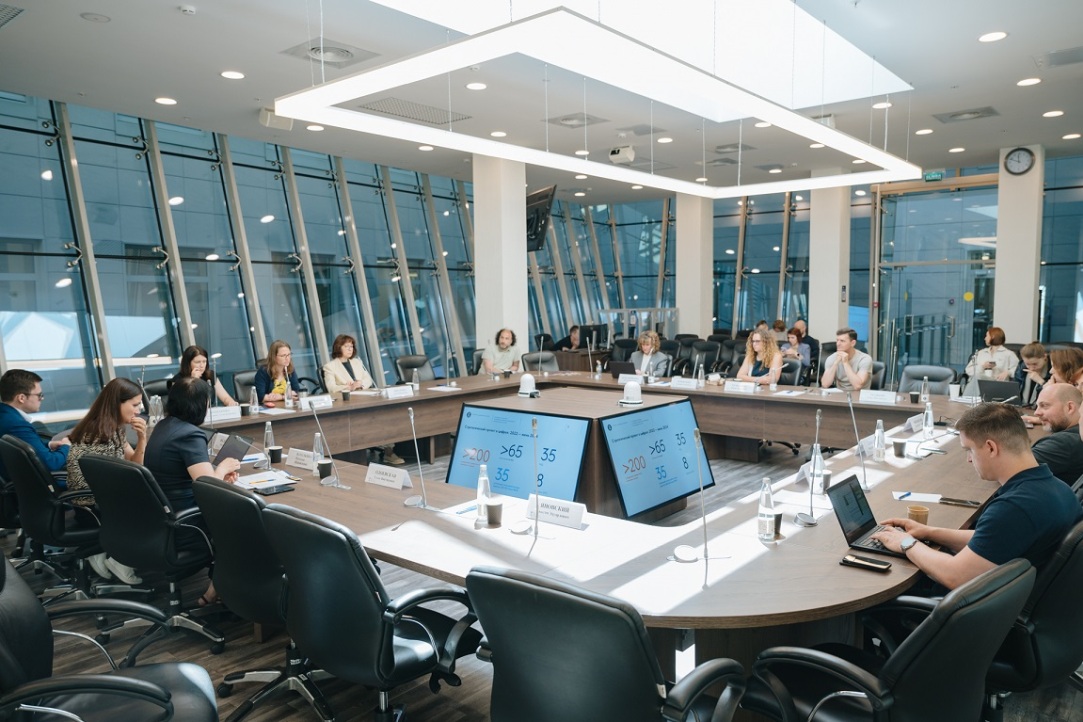
On June 26 and 27, HSE University at Pokrovka hosted a discussion of potential partnerships between the university's research teams and strategic projects under the Priority 2030 programme. During the two-day session, the heads of strategic projects presented the main areas of their ongoing research, highlighted some of the key results achieved, and shared their vision for involving new researchers in the projects.
The session participants were welcomed by Natalia Vatolkina, Deputy of Vice Rector Elena Odoevskaya who coordinates the implementation of the HSE Development Programme. The speaker presented the goals and objectives of the session, introduced the Priority 2030 academic leadership programme, and highlighted the role of strategic projects in the transformation of HSE University.
The Priority 2030 programme aims to support the development of Russian universities, to enhance their scientific and technological potential, and to increase their contribution to achieving Russia's national development goals and ensuring access to quality higher education across Russian regions. The programme involves over 140 universities in 56 regions of Russia, including 54 within the framework of specialised tracks. In 2024, HSE University ranks first among the programme participants in terms of grant amount, thus establishing itself as one of the leaders in the Research Leadership track.
Strategic projects are portfolios of research initiatives under a shared theme. They aim not only to achieve new scientific results with high potential for transfer to the economy and the social sphere but also to drive institutional transformations within HSE University to meet its target model under the Priority 2030 programme. Every year, over 1,000 researchers from more than 55 subdivisions of HSE University participate in the implementation of strategic projects.
Two main models of cooperation between research teams and strategic projects were outlined at the seminar. Researchers can either use strategic projects as platforms to discuss and promote their own scientific results or contribute to shaping the research agendas of the relevant strategic projects. Fuad Aleskerov, Director of the International Centre of Decision Choice and Analysis, proposed conducting an event to showcase work in progress which may be of interest to strategic project teams. Additionally, researchers can propose their own projects for integration into strategic projects.
Presentations by representatives of strategic project teams covered current research areas, future plans, and the competencies they aim to attract to their projects. Presenting the strategic project 'Success and Self-Sustainability of the Individual in a Changing World,' Evgeniy Terentev, Director of the HSE Institute of Education and academic supervisor of the strategic project, outlined the project architecture and pointed out the key elements included in the concept of 'human enhancement.'

'Today, we are witnessing the emergence of numerous opportunities for human enhancement across various fields. However, there is currently no ongoing monitoring of these emerging opportunities, no established procedure for evaluating the effectiveness of existing tools, and a lack of systematic scientific knowledge on how to encourage people to use these new opportunities. Our strategic project revolves around addressing these three issues,' Evgeniy Terentev said.
The implementation of the strategic project has resulted in several outcomes: the first wave of monitoring the use of human enhancement tools has been completed, groundwork has been laid for the development of specific enhancement technologies, recommendations have been formulated to encourage the adoption of engineering and socio-humanitarian technologies by the public, a pool of recommendations for improving existing institutions has been produced, and strategies for student learning behaviour have been identified.
The Strategic Project 'Social Policy for Sustainable Development and Inclusive Economic Growth' was presented by its academic supervisor, Director of the HSE Institute for Social Policy Lilia Ovcharova, and coordinator Svetlana Biryukova. According to the speakers, the strategic project aims to propose a comprehensive model of sustainable social development tailored to the national context. It focuses on creating and promoting evidence-based social policy tools, implementing measures to enhance economic inclusivity, and formulating policies to foster social sustainability and improve the well-being of Russian citizens, particularly that of families.

The project implementation has produced significant results both at the university level and nationally. Lilia Ovcharova also highlighted the role of the strategic project's team as a centre of expertise supporting the development of state social policy measures.
Lilia Ovcharova emphasized the importance of attracting new researchers and new initiatives to the strategic project. This is especially important for creating new, in-demand expert analytical products and populating the digital bank of evidence-based social policy measures to support management decision-making, which is one of the key planned outcomes of the strategic project.
Learn more about this strategic project from Lilia Ovcharova's interview.
Presenting the Strategic Project 'Human Brain Resilience: Neurocognitive Technologies for Adaptation, Learning, Development and Rehabilitation in a Changing Environment,' Igor Sokolov, HSE Director for Research and Development and administrative manager of the strategic project, stressed the project team's priority of developing technologies that enhance human abilities, or 'augmented intelligence,' which place the individual in the centre and organise technologies around and for the individual. To achieve this, HSE University has been developing a distributed neurocognitive cluster that includes teams from all its campuses.
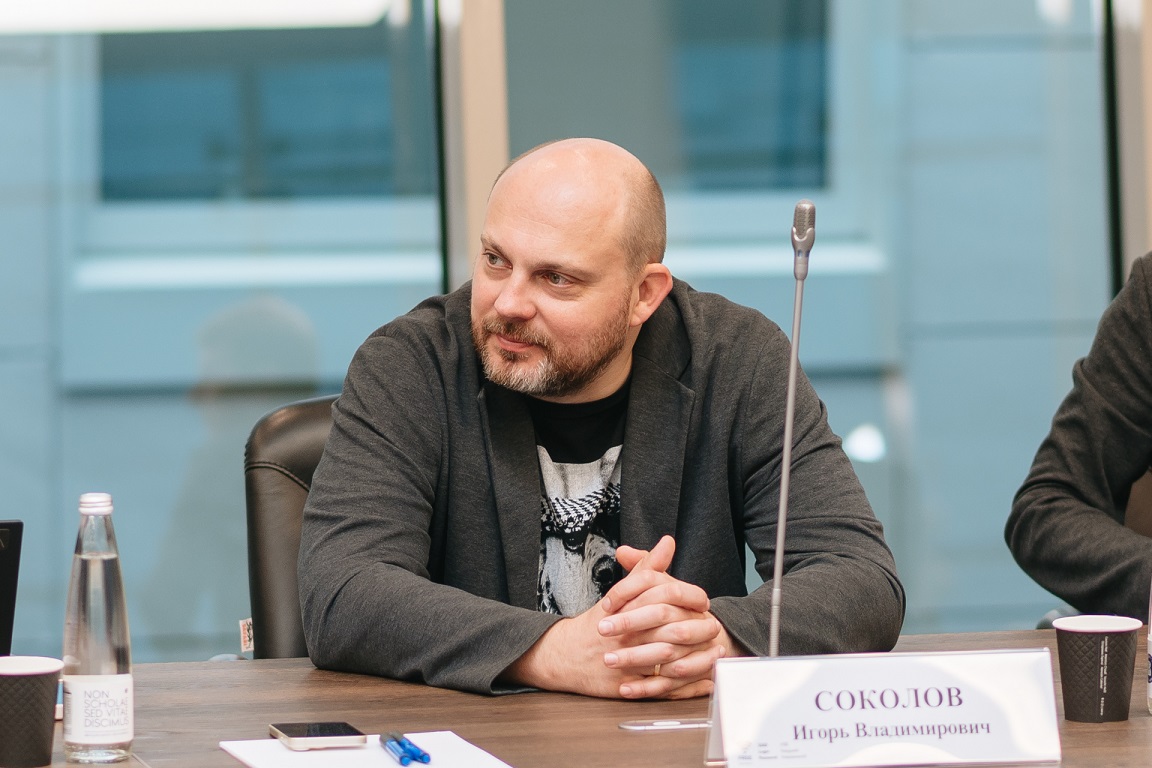
'In the foreseeable future, we believe we will be able to establish the first Centre for Assistive Technologies and Augmented Intelligence to help people solve problems that are otherwise very difficult or impossible to address without such technologies,' according to Igor Sokolov.
By 2030, plans include creating a prototype of a new-generation magnetoencephalograph to support import substitution in this field, developing next-generation neuroprostheses using brain-computer interfaces, creating prototype algorithms for a hearing diagnostic system based on machine learning and neuromodelling, and achieving several other applied results.
In conclusion, Igor Sokolov proposed convening a joint session to explore the possibilities of commercialising the applied results from all strategic projects, with the participation of the HSE Network Centre for Technology Transfer. Additionally, he emphasised the importance of popularising science and building competencies in science journalism to successfully promote HSE University's research in the field of cognitive neuroscience.
The Strategic Project 'National Centre of Science, Technology and Socio-Economic Foresight' was presented by Mikhail Goland, Director of the HSE Centre for Strategic Forecasting and administrative head of the project. According to Mikhail Goland, the primary goal of the strategic project is to establish a global centre of excellence in forecasting based at HSE University, and key objectives include developing a series of medium- and long-term forecasts to create a comprehensive future outlook, while identifying priorities for advancing science, technology, economic sectors, and social innovations. The project also aims to foster a scientific school of forecasting at the university, particularly by involving students, including doctoral students, in related projects, and promoting a culture of foresight studies in Russia and internationally.
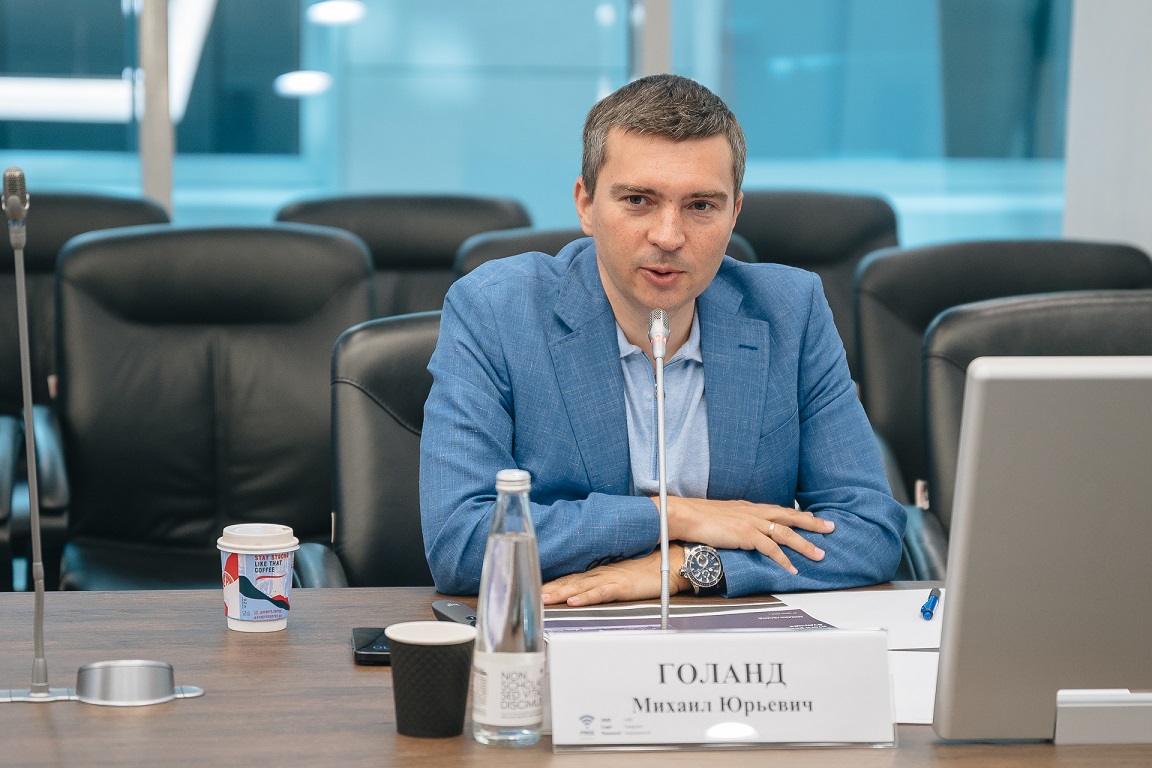
The most significant results of this strategic project to date include conducting a large-scale study on scenarios for Russia's socio-economic development until 2030, establishing a library of methods, models, and tools for scientific, technological, and socio-economic forecasting, producing a series of high-level monographs on scientific and technological forecasting and foresight, and launching several educational programmes in this field.
The new Strategic Project 'Human-Centred AI ,' initiated in 2024, was presented by Alexey Masyutin, Director of the HSE AI and Digital Science Institute, and Elena Kozhina, coordinator of this strategic project and projects in AI and digital science, and Deputy to Vice Rector Elena Odoevskaya.
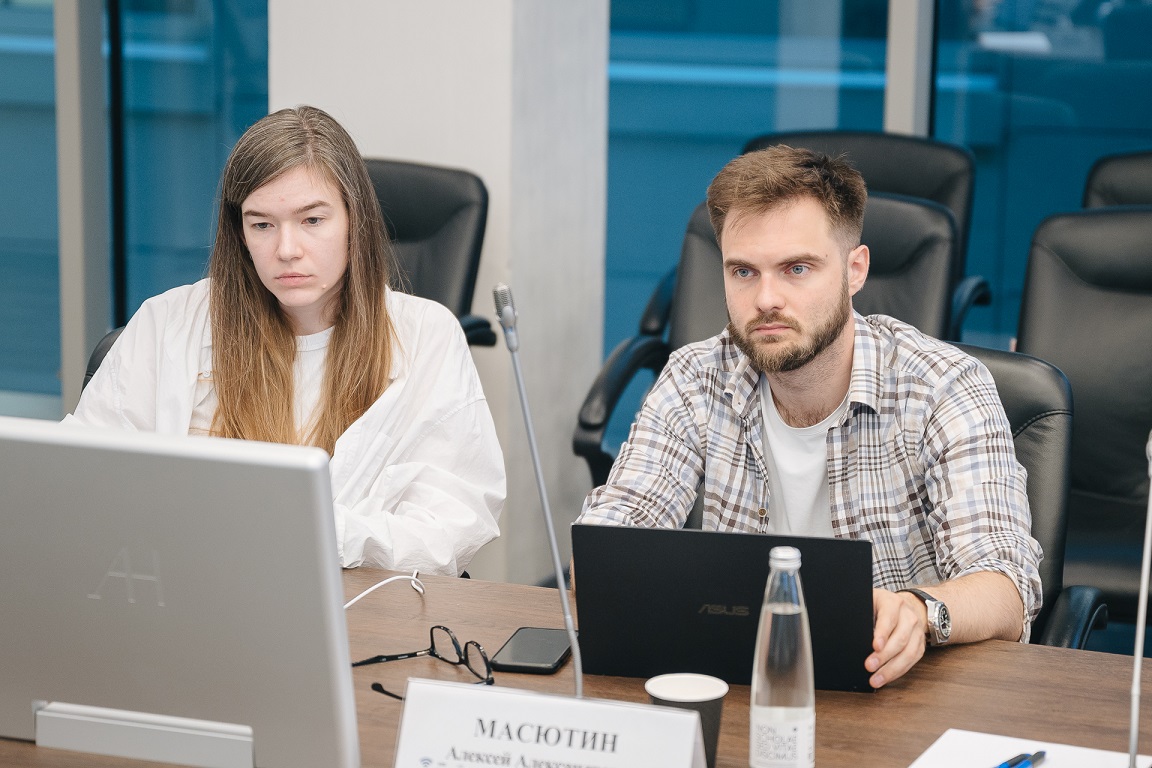
The main goal of the project is to develop a series of products using AI technologies that assist people in areas such as education, management, and medicine. Priorities for the coming years include the development of AI assistants to help HSE University's students and staff with routine tasks and to contribute to the educational process and applications to enhance the diagnostic capacity in spinal surgery and postoperative rehabilitation for the university’s partner healthcare providers. Another envisioned area of focus is market research to identify sectors where the introduction of artificial intelligence technologies holds the most promise.
The key advantage of the strategic project lies in the team's extensive experience in developing and implementing products across various industries, which they are prepared to share with other researchers at HSE University. In its turn, the strategic project is actively seeking new ideas for AI products that can enhance human life.
Ideas and suggestions
Throughout the session, participants asked questions about each project, discussed prospects for cooperation with various stakeholders, and offered ideas for project development. The attending researchers were interested in whether market assessments had been conducted for the projects, how product testing would be performed, how interdisciplinary teams could be recruited within HSE University, whether there were prospective customers and external inquiries, and how project team members were responding to them.
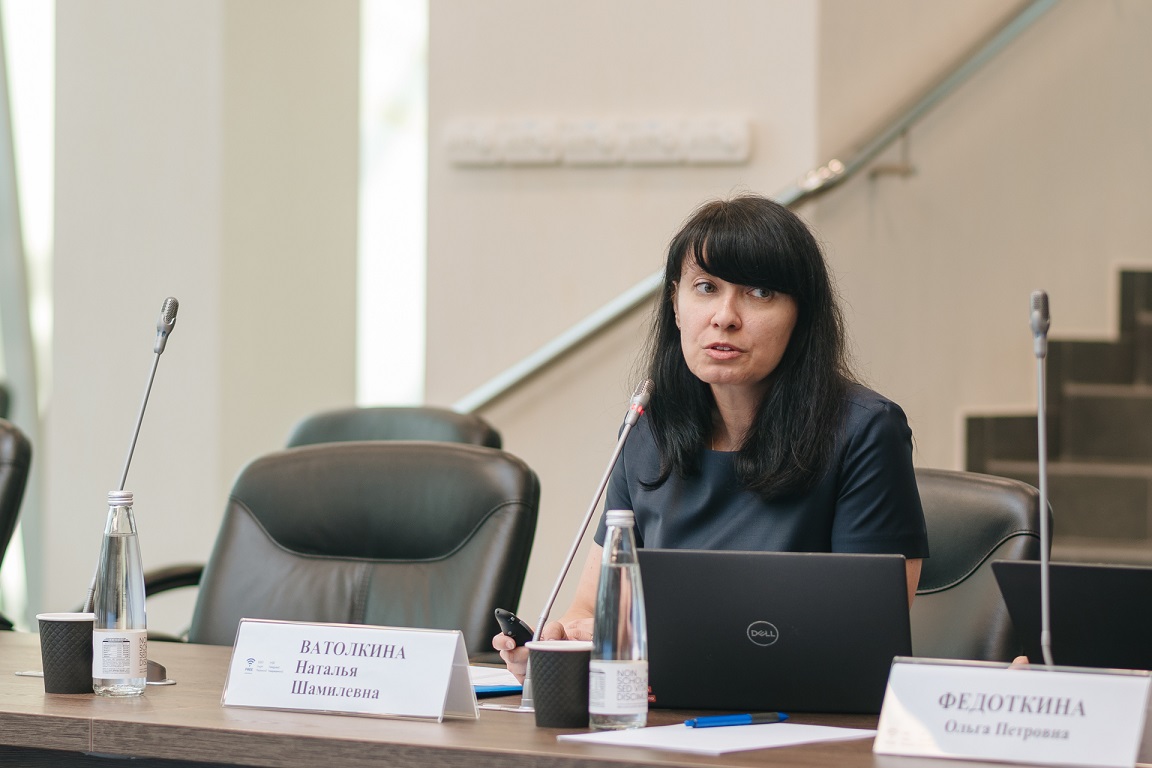
Wrapping up the session, Natalia Vatolkina invited participants who were not yet on the strategic project teams to share their ideas on the project content and ways to promote the results.
See also:
HSE Researchers Introduce Novel Symmetry-Aware Neural Network Architecture
Researchers at the HSE Laboratory for Geometric Algebra and Applications have developed a new neural network architecture that can accelerate and streamline data analysis in physics, biology, and engineering. The scientists presented their solution on July 16 in Vancouver at ICML 2025, one of the world's leading conferences on machine learning. Both the paper and the source code are publicly available.
HSE Researchers Determine Frequency of Genetic Mutations in People with Pulmonary Hypertension
For the first time in Russia, a team of scientists and clinicians has conducted a large-scale genetic study of patients with pulmonary arterial hypertension. The team, which included researchers from the International Laboratory of Bioinformatics at the HSE Faculty of Computer Science, analysed the genomes of over a hundred patients and found that approximately one in ten carried pathogenic mutations in the BMPR2 gene, which is responsible for vascular growth. Three of these mutations were described for the first time. The study has been published in Respiratory Research.
HSE Scientists Reveal How Disrupted Brain Connectivity Affects Cognitive and Social Behaviour in Children with Autism
An international team of scientists, including researchers from the HSE Centre for Language and Brain, has for the first time studied the connectivity between the brain's sensorimotor and cognitive control networks in children with autism. Using fMRI data, the researchers found that connections within the cognitive control network (responsible for attention and inhibitory control) are weakened, while connections between this network and the sensorimotor network (responsible for movement and sensory processing) are, by contrast, excessively strong. These features manifest as difficulties in social interaction and behavioural regulation in children. The study has been published in Brain Imaging and Behavior.
‘The Future Is Not Predetermined—We Shape It with the Decisions We Make Today’
The strategic technological project ‘National Centre of Science, Technology, and Socio-Economic Foresight’ at HSE University spans horizons of 10 to 30 years and involves developing new methodologies of scenario analysis. It brings together researchers from different fields and helps to form a holistic vision of the future. The aim of the project is not only to produce forecasts but also to generate practical recommendations for government and business. Anastasia Likhacheva, Dean of the HSE Faculty of World Economy and International Affairs, explains why it is important to learn to ask the right questions about the future.
HSE University–St Petersburg Holds Summer Intensive Course on Finance for Students from Five Countries
The International Summer School at HSE University–St Petersburg included the intensive course 'New Economic Drivers for Company.' International students explored the realm of applied finance through case studies of Russian companies.
Updated Facts and Figures and Dashboards Now Available on HSE Website
The HSE Office of Analytics and Data Management, together with the Visual Communications Unit, has developed a new Facts and Figures about HSE University page on the HSE website. In addition, all university staff now have access to a dashboard with the updated indicators of the Priority 2030 programme.
HSE to Entrust Routine CPD Programme Development to AI
HSE University, together with the EdTech company CDO Global, is launching AI-based constructors to streamline the design of continuing professional development (CPD) courses. The new service will automate the preparation of teaching materials and assessment tools, significantly reducing the time and resources required of lecturers and instructional designers.
‘Territory of the Future. Moscow 2030’ Forum-Festival to Feature Innovative Projects from HSE Graduates
Until September 14, 2025, the Russian capital is hosting a large-scale forum-festival called ‘Territory of the Future: Moscow 2030’ —a space for technology, science, and innovation. This event showcases cutting-edge developments in medicine, astronautics, and the digital economy. HSE Art and Design School is participating in the festival with two graduate projects in Product and Industrial Design.
‘The Goal of Modern Geography Is To Digitise Expert Knowledge and Integrate It with Big Data’
The importance of geographical science is increasing, as is the demand for education in this field. Since 2020, application numbers for Bachelor’s programmes at HSE University’s Faculty of Geography and Geoinformation Technology have climbed by 30%, while interest in Master’s programmes has also expanded, with applications up 10–15%. Nikolay Kurichev, Dean of the Faculty, spoke about this at a press conference hosted by MIA Rossiya Segodnya.
HSE Shares Its Experience of Urban Strategies at International Summer School in China
In the context of intensifying global geopolitical and technological competition, leading Chinese educational institutions—Zhejiang International Studies University and Peking University—organised an International Summer School. Their joint programme focused on studying global, regional, and urban development strategies. The HSE Faculty of Urban and Regional Development took part in this event.


